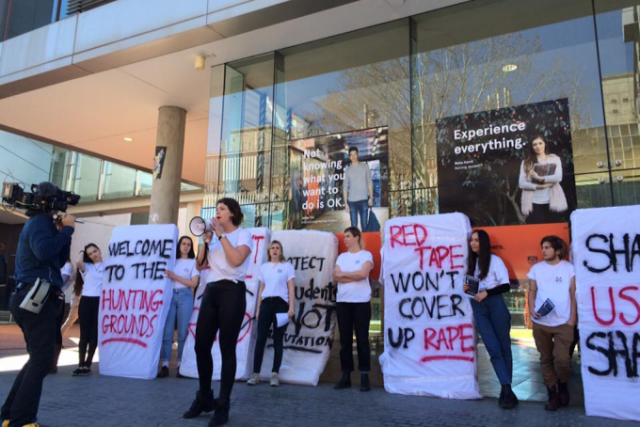
In February last year, 39 universities signed up to “Respect. Now. Always”, a campaign to eliminate sexual assault and harassment on campus. But more than a year later, there are no new initiatives in place and students are asking why.
Almost 40,000 students took part in the research project undertaken by the Australian Human Rights Commission to find out how widespread sexual assault and harassment really on Australian universities. The report was due out in May, but has been postponed to August 1.
Students are concerned that some universities may not release the data. In April, Triple J’s Hack reported that Universities Australia chair Professor Barney Glover said universities would not be compelled to release the data relating to their universities because they were “independent bodies” and could therefore make their own decisions.
Students at Western Sydney University (WSU), where Glover is Vice Chancellor, were shocked. WSU student Nathalie Caroline Jerez told Green Left Weekly: “Releasing the data is the first step in getting people to realise that this is an important issue which is not being taken seriously. Universities need to do better.
“The current policy guiding WSU urgently needs to be changed. Releasing the data will play an important part in charting an adequate response to this problem which is still seen as secondary.”
Students are also angry that the Human Rights Commission will not make binding recommendations to the universities. WSU student Katie Wilkinson said: “Sexual harassment is a crime but it is not being treated with the seriousness it requires to make the educational, cultural and practical changes that are needed. If the Human Rights Commission cannot mandate universities to change their approach, which the surveys show is not working, then who or what can?”
A survey conducted by the National Union of Students (NUS) in 2015 showed that sexual harassment on campuses is rampant. The Talk About It survey looked at accommodation, safety, student services, sexual assault, harassment and economic difficulties that women enrolled in tertiary education institutions face. It showed that 72.75% of female university students had experienced sexual harassment or unwelcome sexual behaviour.
The survey revealed that while some respondents said universities and external services had helped to address their experiences, “the overwhelming view was that they needed improving”.
For example, the policy currently at WSU recommends that the victim first talk or write to the person who assaulted them! After that, it suggests the person who has been harassed contact Campus Safety & Security — who are not trained councillors — the University Counselling Service (but only during business hours) or the police.
Alternatively, it directs the person to contact the Rape and Domestic Violence Services Australia (RDVSA) 1800RESPECT hotline, which is currently fighting federal government plans for privatisation.
1800RESPECT was launched in 2010 to provide specialist sexual assault and domestic violence counselling. There has been a 300% rise in calls to RDVSA since then.
A 70-page report released in January by End Rape on Campus Australia, which was compiled by current and former university students, lays out the challenges facing universities today. Professor Catherine Lumby said in the report’s foreward that sexual assault can have a “disproportionate and devastating impact on students, who are overwhelmingly female”.
“It’s an impact that can last a lifetime”, she noted. “Students underperform, drop out of their studies, struggle to trust others again and are at risk of developing mental illness. Alarmingly, many universities are compounding this trauma by failing to support survivors and, in some cases, actively seeking to silence them.
“Policies across our tertiary sector are inconsistent, often opaque, and not informed by best practice trauma response … The sector’s response to assaults is equally too often legalistic and bureaucratic. Despite having a clear duty to provide a safe environment on campus for all students, many universities continue to see assault as purely a matter for the police…
“Too often, our universities have dealt with sexual assault and harassment of students by turning a blind eye, by claiming it is not their responsibility or, most shamefully, by actively covering up assaults. It is time to face the evidence and put a full stop to harassment and assault on campus.”
The report noted: “Attitudes that minimise sexual assault, shift blame onto victims or normalise non-consensual activity create a climate in which sexual assault is both more likely to occur, and less likely to be recognised and reported.”
While perpetrators are overwhelmingly male and victims are overwhemingly female WSU’s instructions on what to do leads off with an example of how “Tim” dealt with harassment which included getting counselling from 1800RESPECT, getting a “good night’s sleep” and “healing”.
The End Rape on Campus report noted that survivors often have a range of complex needs after experiencing sexual assault and “in many cases, these needs are not met by the systems in place at universities”.
It said the lack of “a holistic approach to supporting survivors” is a key concern. It notes that the “overarching problem with universities’ collective failure to address sexual violence” is its conceptualisation of the problem as “primarily a private concern” or “a woman’s responsibility”.
“Incidents of sexual assault are treated as rare, disconnected and random, rather than the inevitable product of a social context with deep-rooted and persistent gender inequality.”
[Resistance activists at WSU are organising a meeting to discuss how to deal with sexual assault on campus with the aim of bringing a more holistic approach to the problem. The meeting is on Wednesday May 24, 2-4pm at EB.G.02. Mia Sanders is a national co-convenor of Resistance Young Socialist Alliance.]
Like the article? Subscribe to Green Left now! You can also like us on Facebook and follow us on Twitter.